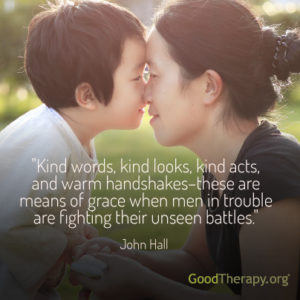12 Quotes About the Power of Kindness
Kindness is a trait many people consider key to being a “good person,” but it can be taken for granted. The importance of being kind often becomes clearer when we experience kindness from another person.
Being treated with kindness can improve a person’s mood. In addition, treating others with kindness may increase happiness and self-esteem in the person doing the action. This may even start a chain reaction of kindness among a group!
The following quotes highlight the impact kindness and compassion may have. While the idea of kindness may seem trite to some, its effects when in action can be quite powerful. Spread some kindness and positivity by sharing one of these quotes with your friends on Facebook and Twitter. Or keep one as a reminder to yourself to practice kindness daily.

“Ah, kindness. What a simple way to tell another struggling soul that there is love to be found in the world.” -A. A. Malee

“A single act of kindness throws out roots in all directions, and the roots spring up and make new trees.” -Amelia Earhart

“Kind words, kind looks, kind acts, and warm handshakes-these are means of grace when men in trouble are fighting unseen battles.” -John Hall
“Constant kindness can accomplish much. As the sun makes ice melt, kindness causes misunderstanding, mistrust, and hostility to evaporate.” -Albert Schweitzer
“Your acts of kindness are iridescent wings of divine love, which linger and continue to uplift others long after your sharing.” -Rumi
“Things could change so entirely, in a heartbeat; the world could be made entirely anew, because someone was kind.” -Jo Baker, Longbourn
“One kind word can change someone’s entire day.” -Unknown
“Every act of kindness is a piece of love we leave behind.” -Paul Williams
“Kindness is more than deeds. It is an attitude, an expression, a look, a touch. It is anything that lifts another person.” -Plato
“Be kind to yourself. We all have our limits; knowing what they are can help encourage self-compassion.”
“How far you go in life depends on you being tender with the young, compassionate with the aged, sympathetic with the striving, and tolerant of the weak and the strong. Because someday in life you will have been all of these.” -George Washington Carver
“Hurt people hurt people. That’s how pain patterns get passed on, generation after generation after generation. Break the chain today. Meet anger with sympathy, contempt with compassion, cruelty with kindness. Greet grimaces with smiles. Forgive and forget about finding fault. Love is the weapon of the future.” -Yehuda Berg
It is possible that people may receive positivity in return when they are kind to someone else. One study highlighted this fact. It found that performing random acts of kindness was linked to a decrease in symptoms for people with social anxiety.
Being kind to others may directly impact mental health. People with mental health issues may be particularly vulnerable to negativity from others. A kind word or smile might reinforce to someone that the world can be a positive place and that they are valued by others. This may help ward off feelings of hopelessness that can characterize conditions like depression.
A good therapist knows how to practice kindness. They often strive to use kindness and compassion as they explore mental health issues with people in therapy. If you feel you could benefit from speaking to a professional about mental health, you can start searching for a therapist here.
Reference:
Dallas, M. (2015, July 10). For those with social anxiety, acts of kindness may be therapeutic. Retrieved from http://health.usnews.com/health-news/articles/2015/07/10/for-those-with-social-anxiety-acts-of-kindness-may-be-therapeutic
© Copyright 2007 - 2025 GoodTherapy.org. All rights reserved.The preceding article was solely written by the author named above. Any views and opinions expressed are not necessarily shared by GoodTherapy.org.